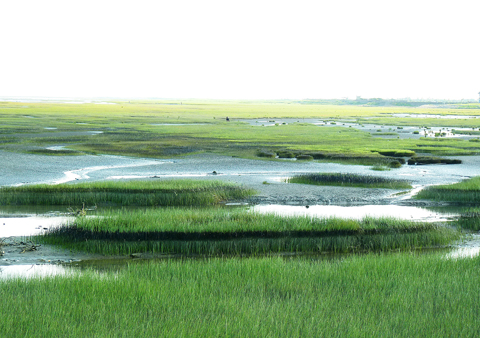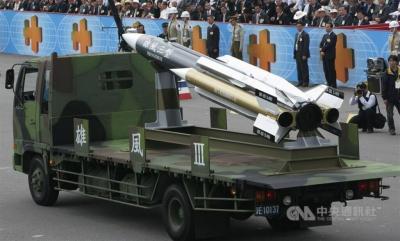The Gaomei Wetlands (高美溼地) in Taichung County, one of the most important wildlife sanctuaries along the nation's coastline, has been polluted by heavy waste oil dumped by unknown sources, environmental officials said yesterday.
The waste oil pollution, stretching for nearly 2km and covering about 1,000m² of the wetland, is the worst manmade environmental damage the sanctuary has sustained in recent memory, said Jiang Chu-nung (姜祖農), head of the Environmental Protection Administration's central Taiwan environmental monitoring corps.
“Initial investigations show that the heavy oil comes from utility boilers,” Jiang said, adding that there are no such plants nearby.

PHOTO: CNA
The Taichung County Government's environmental department has launched a probe into the cause of the pollution and according to the department, the oil could have been dumped from fuel tankers.
Local police said they were reviewing video monitor footage in hopes of identifying the culprits.
More than 100 cleanup crew and environmental volunteers have been mobilized to clean up the waste oil since Tuesday night, and county officials said floating booms had been deployed to prevent the oil from further spreading.
Firefighters have also put absorbent fibers on the beach to absorb and contain the oil slick.
“About a quarter of the polluted area is wetland subject to strict protection,” said an official with the county government's conservation department. “It is tragic that someone has unscrupulously damaged the wetland that we have been so painstakingly working to conserve.”
A group of Tunghai University professors inspecting the polluted region yesterday morning said an endangered wetland plant species Bolboschoenus planiculmis was seriously damaged by the pollution and might be wiped out.
Other special wetland species such as fiddler crabs and various fish have also sustained damage, they said.
The Gaomei Wetlands, located on the south bank of the Dajia River (大甲溪) estuary, is rich in biodiversity and plays host to different migratory birds and plant species.

STATS: Taiwan’s average life expectancy of 80.77 years was lower than that of Japan, Singapore and South Korea, but higher than in China, Malaysia and Indonesia Taiwan’s average life expectancy last year increased to 80.77 years, but was still not back to its pre-COVID-19 pandemic peak of 81.32 years in 2020, the Ministry of the Interior said yesterday. The average life expectancy last year increased the 0.54 years from 2023, the ministry said in a statement. For men and women, the average life expectancy last year was 77.42 years and 84.30 years respectively, up 0.48 years and 0.56 years from the previous year. Taiwan’s average life expectancy peaked at 81.32 years in 2020, as the nation was relatively unaffected by the pandemic that year. The metric

Taiwan High Speed Rail Corp. (THSRC) plans to ease strained capacity during peak hours by introducing new fare rules restricting passengers traveling without reserved seats in 2026, company Chairman Shih Che (史哲) said Wednesday. THSRC needs to tackle its capacity issue because there have been several occasions where passengers holding tickets with reserved seats did not make it onto their train in stations packed with individuals traveling without a reserved seat, Shih told reporters in a joint interview in Taipei. Non-reserved seats allow travelers maximum flexibility, but it has led to issues relating to quality of service and safety concerns, especially during

A magnitude 5.1 earthquake struck Chiayi County at 4:37pm today, the Central Weather Administration (CWA) said. The hypocenter was 36.3km southeast of Chiayi County Hall at a depth of 10.4km, CWA data showed. There were no immediate reports of damage resulting from the quake. The intensity of the quake, which gauges the actual effect of a seismic event, measured 4 in Chiayi County, Tainan and Kaohsiung on Taiwan's seven-tier intensity scale, the data showed. The quake had an intensity of 3 in Chiayi City and Yunlin County, while it was measured as 2 in Pingtung, Taitung, Hualien, Changhua, Nantou and Penghu counties, the data

The Supreme Court today rejected an appeal filed by former Air Force officer Shih Chun-cheng (史濬程), convicted of Chinese Communist Party (CCP) espionage, finalizing his sentence at two years and two months for contravening the National Security Act (國家安全法). His other ruling, a ten-month sentence for an additional contravention, was meanwhile overturned and sent to the Taichung branch of the High Court for retrial, the Supreme Court said today. Prosecutors have been notified as Shih is considered a flight risk. Shih was recruited by Chinese Communist Party (CCP) intelligence officials after his retirement in 2008 and appointed as a supervisor